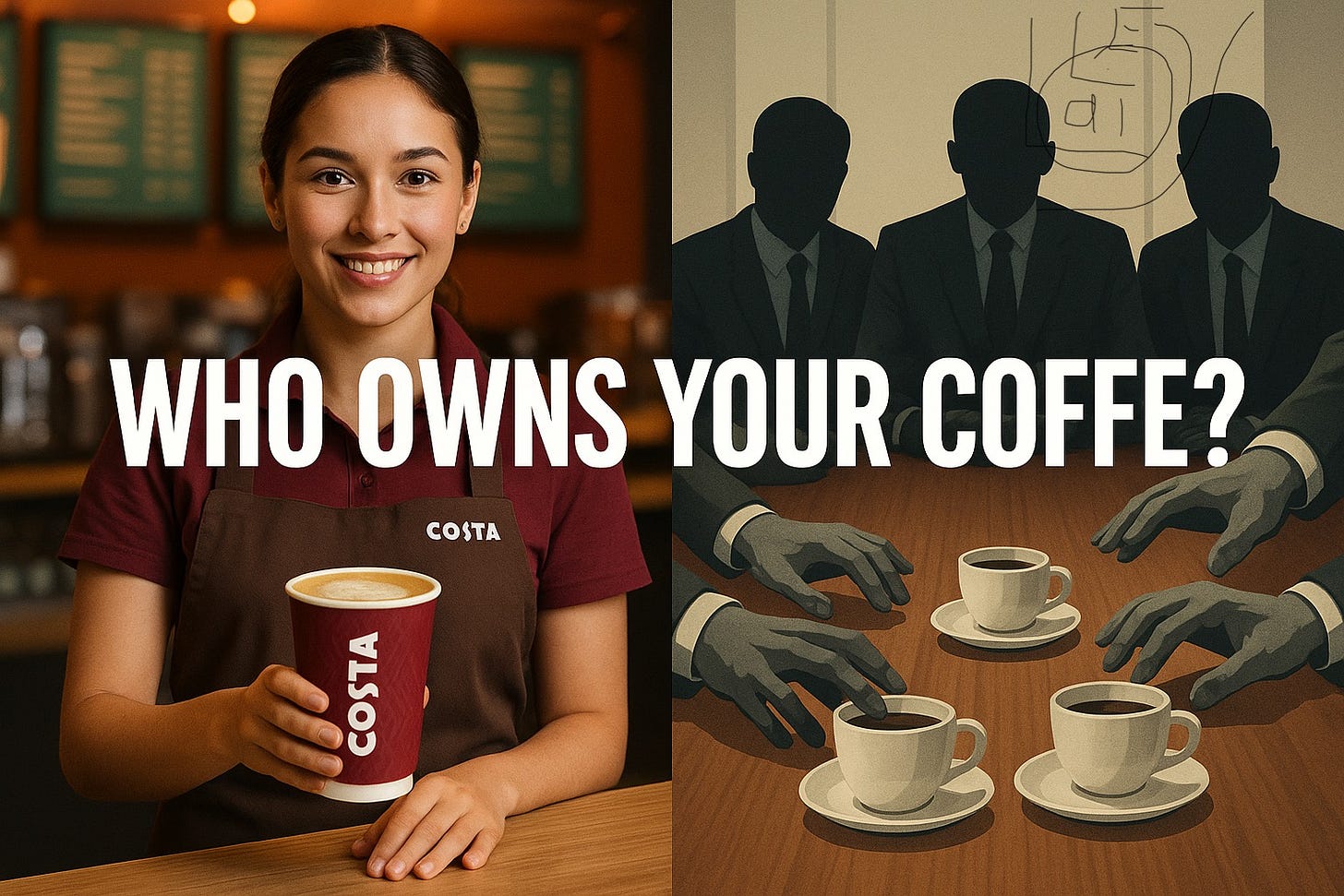The Battle for Costa Coffee is on
The Frontrunner Appears to be TDR Capital Owners of ASDA, Stonegate (UK's Biggest Pub Group) and David Lloyd's Gymnasiums
Costa Coffee: Who Gets to Own Your Latte?
The battle for Costa Coffee is on. Coca-Cola has had enough of running Britain’s best-known café chain and wants out. The bidders are circling. Apollo Global, the American giant that owns Wagamama, fancies a taste. Citic from China is weighing up whether to splash some state-backed billions on a global brand. Even KKR, Wall Street’s private-equity bruiser, has been sniffing around. These aren’t just faceless financiers. They are the people who bankroll your noodles, pull the strings at your pharmacy, and quietly shape the prices you pay when you stroll down the high street
But the frontrunner is closer to home: TDR Capital, the Mayfair private-equity house with a taste for Britain’s everyday life. It already owns Asda, where millions still do their weekly shop. It controls Stonegate, the biggest pub chain in the country, stretching from Yates’s to Slug & Lettuce to your anonymous local. It even has David Lloyd gyms, playground of the suburban middle classes. If they get Costa, the same investors who fill your trolley, pour your pint, and take your tennis subs will also be serving your flat white.
That prospect comes with a history. TDR’s record at Asda is chequered: a blizzard of debt, wafer-thin margins, and rivals eating its lunch. In 2020, working hand-in-glove with the Issa brothers of EG Group, TDR went after Caffè Nero. The pandemic had battered Nero, and it needed a Company Voluntary Arrangement just to keep landlords at bay. EG and TDR pounced with a hostile bid. They didn’t just knock on the door — they came in through the back, buying up Nero’s debt in a classic “loan-to-own” play. It’s common private-equity practice: control the creditors, control the company. But Nero fought them off. Gerry Ford dug in, creditors held their nerve, and the courts threw out the challenges. Against the odds, Nero survived.
Why does that matter now? Because Costa is an easier prize. It doesn’t need to be forced into a CVA — it’s up for sale. And TDR already knows how to monetise coffee because they understand the forecourt game better than anyone. EG Group built an empire by turning petrol stations into one-stop shops: fill up the car, grab a Greggs, pick up a Subway, maybe a KFC on the way out. And always — always — a coffee. Costa Express machines were made for this world: quick, consistent, margin-friendly. If TDR bags Costa, expect the Express estate to mushroom across every roadside and forecourt they can get their hands on. Fill up the car, fill up on coffee.
But here’s the rub: Costa isn’t just vending machines. It’s high-street cafés. And here, the comparison with Nero is revealing. Costa is the Greggs of coffee — middle-market, mass produced, dependable but bland. Nero sells itself as more upmarket: Italian music, low lighting, continental charm. And Nero has been quietly clever. While Costa ploughed everything into its red-branded outlets, Nero built a stable of boutique chains. 200 Degrees, born in Nottingham, roasting its own beans and running barista schools, now stretches across the Midlands. Coffee#1 dominates Wales and the South West with its cosy, indie feel. Other small names give Nero the ability to catch the aspirational drinkers who sneer at Costa’s paper cups.
That matters because the market is shifting. Younger customers want authenticity, latte art, small-batch beans, a barista who looks like they listen to vinyl. Nero can give them that. Costa can’t. If TDR gets Costa and runs it like Asda — cut, consolidate, pile on the debt — they risk locking Costa into a middle-market rut while independents and Nero’s boutique offshoots eat the premium end alive.
Yes, TDR has hospitality experience now. With Stonegate pubs, they manage thousands of venues, staff rotas, tills, and supply chains. They know how to squeeze another pint out of the barrel. But coffee isn’t beer. A latte is about mood and brand. It’s about making people feel good about parting with £3.50 for something they could brew at home for 20p. That requires imagination, not just financial engineering.
So can TDR make Costa profitable? Probably — they’ll push Express hard, strip costs out of the cafés, and lean on the same sale-and-leaseback tricks they used at Asda. But will they make Costa better? That’s another question. Because Nero, with its boutique army and continental swagger, has already shown it can beat back the predators. And Costa, under Coke, has already proved it can lose its way. If TDR gets the keys, Britain’s flat whites may be profitable again — but they may also be blander than ever.



